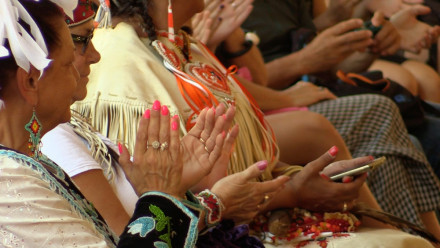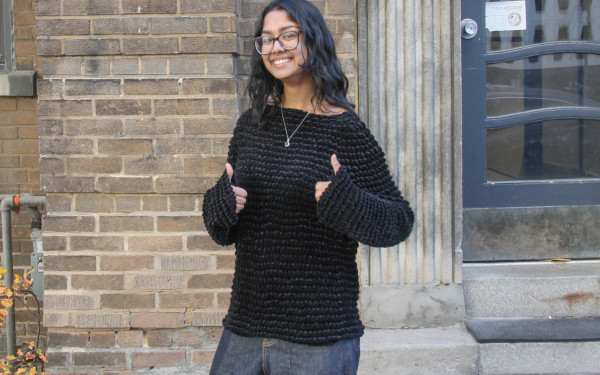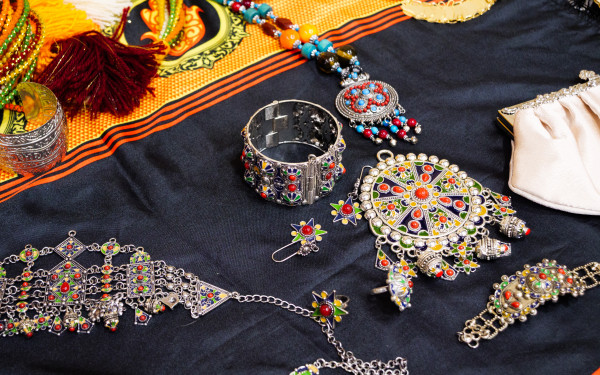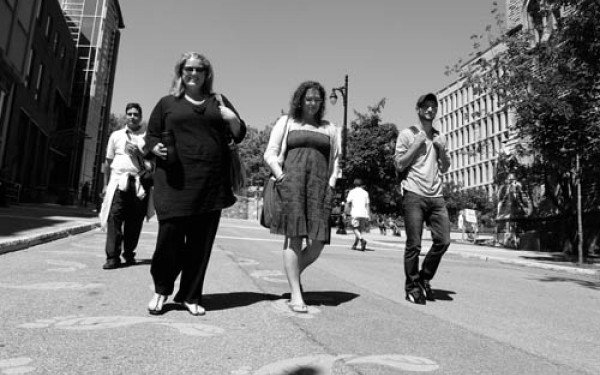McGill Hosts 14th Annual Pow-Wow
Last Friday, McGill hosted its 14th annual pow-wow to jumpstart its Indigenous Awareness Week.
Every year, McGill Pow-Wow offers a meeting point for Aboriginal people living in Montreal. A pow wow is a social gathering meant to link the indigenous community, creating connections between would-be strangers, and sharing the community’s heritage.
One of many aboriginal Quebecers at the event, Don Barbaby, a Mi’kmaq man living in Listuguj in eastern Quebec, travels the country to dance in pow wows, around 40 a year. In a hurry to go back dancing, he quickly ended our discussion.
“I dance for those who can’t dance, I sing for those who can’t sing,” Barbaby said.
From 11 a.m. to 4 p.m. a steady and smiling crowd strolled around the lower field of the university. Under a warm sun, the rhythm of the drums cadenced the day. The mood was festive, exuberant, performers only leaving the dance to invite the audience to join them. From children to elders, all age and origins united to dance together.
Traditional and inter-tribal performances alternated under the main tent. Occasionally, the audience was asked to neither take pictures, nor participate, when sacred songs were chanted. Later on, the pow wow welcomed spoken word and storytelling from Inuit artists.
Midway through the day, an Inuit throat singing competition began. This unique and fascinating contest mesmerized the audience. A vocal duel, the competition involved two women holding and facing each other, attempting to match each other’s vocals until one either fell out of rhythm or ran out of breath.
For a few moments the field was filled with their low and sensual growling, setting a new harmonic and musical language. Historically this competition was organized for women to win a hunter’s heart, or materials and clothing. Now, there are no stakes, other than an captivating show of vocal prowess.
Outside of the main tent, artisan vendors sold their art, from jewellery to dream-catchers. The field also served as a window for student associations and Indigenous organizations.
The Native Women’s Shelter of Montreal was present to raise awareness and recruit new student volunteers. The shelter welcomes women fleeing domestic violence or struggling to integrate into the city.
“Women are allowed to stay for 10 weeks and offer a healing program, including affordable housing, support to get back into the workforce and personal counseling, for the ones who went through traumas,” said Marcelle Durrum, therapist for the shelter. “As the only native shelter in Montreal, traditional therapies and ceremonies have a central place. It helps women regain some cultural pride.”
A few tables away, the Concordia Aboriginal Student Resource centre was answering questions and promoting their next cultural event. Nadine Montour, coordinator of the center, described the pow-wow as a great networking and recruitment event to reach out to new Aboriginal students, as well as “a fantastic, positive engagement for the community.”
Last year, the centre organized Concordia’s first Aboriginal Student Week, titled First Voices week. Always in process of building the community and organizing new events, they aim to raise awareness, offer moral support and celebrate aboriginal cultures.
This annual pow-wow is defined as a welcoming place for new students to connect with their community and preserve their traditions inside the city. The week of Sept. 21 to 25, McGill will be holding workshops, film screenings, and discussions on reconciliation and First Nations and Inuit cultures. Here, an open and inclusive space will be offered for the vibrant community of aboriginal people living in Montreal.




_600_375_90_s_c1.jpg)


